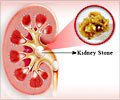Frequent kidney dialysis is essential for the approximately 350,000 end-stage renal disease (ESRD) patients in the United States.

Over the past several years, lead author John Lambris, PhD, the Dr. Ralph and Sallie Weaver Professor of Research Medicine, Perelman School of Medicine at the University of Pennsylvania, and his colleagues have developed small molecule versions of the drug compstatin, which inhibits a component of the complement immune response called C3. Lambris explains that this next-generation compound, called Cp40, "is a small peptide similar to cyclosporine in many aspects, however it uses a different mechanism of action."
Previous studies by Lambris and his team, in which modern polymer-based hemodialysis filters were perfused with human blood, showed significant complement activation and an increase in inflammatory biomarkers. This response could be suppressed using compstatin, suggesting that it might be used in dialysis to decrease the inflammatory response side effect.
The new study took place in non-human primates to validate Cp40's complement-inhibiting properties in whole animals. Even after undergoing a single session of dialysis using a pediatric hemodialysis filter with high biocompatibility, healthy animals showed strong complement activation with 5 percent of their C3 being converted to a form that can trigger inflammation and stimulate the immune system.
"This is a huge amount of activation because hemodialysis patients go every two or three days, three times a week, for treatment," says Lambris. Such repetitive complement activation may create a cytokine boost in humans that could fuel the chronic inflammatory response in renal disease patients. When a single dose of the Cp40 compound was administered, the animals displayed a complete suppression of complement, as indicated by C3 activation levels.
A major advantage of this new approach is that it's short-term: "The treatment is only for the time of hemodialysis," Lambris explains. "It's not a lasting inhibition. You start hemodialysis, you give the compound, and you inhibit during hemodialysis. After the procedure, the complement system quickly regains its full activity." This avoids potential concerns about adverse effects caused by long-term complement suppression. Cp40 can also be manufactured at relatively low cost, easing the already-high financial burden of maintenance dialysis for ESRD patients.
Advertisement
The Cp40 treatment can be even more cost-effective because, as Ricklin notes, "You may select patients who would benefit most from the treatment, depending on their underlying condition, or have to use filters with lower biocompatibility. Physicians would then have the option of a selective add-on treatment, therefore controlling the treatment cost overall."
Advertisement
The chances for clinical translation of this novel therapeutic approach are promising since AMY-101, a drug that is based on Cp40, is currently under clinical development, notes Lambris.
Source-Eurekalert















